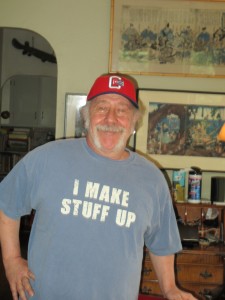 One of the two T-shirts I bought while we were hanging in Provincetown last week. The other is pictured on my Zachary Klein Facebook Authors Page, which, if you check it out, please “Like” the page.
One of the two T-shirts I bought while we were hanging in Provincetown last week. The other is pictured on my Zachary Klein Facebook Authors Page, which, if you check it out, please “Like” the page.
I bought this shirt because it is funny, it is true, and it made me think about what fiction really is. Where is the line between reality and a reflection of reality? What is that line? These aren’t entirely new questions because countless people, who have read my Matt Jacob books, have asked how I was able to do as much drugs and drink as my hero and still write a book.
Clearly they believed that Matt Jacob was me rather than a make-believe character. There’s part of that conflation I appreciate. It suggests that Matt, my character, is believable enough to be real; and, as a novelist, that is rewarding. It’s less rewarding to be thought of as a drunken dope addict, but hey, if that’s the price I pay to create interesting characters, so be it.
Actually I begin each book pondering about themes. What undercurrents of life do I want to think about and explore? Betrayal? Ass-biting from the past? Manipulation? Lies? There’s gotta be an overarching idea I’m interested in before I start writing. Then, it’s how will my characters relate in their own way to the particular theme while still surprising me with aspects of their personality. Writing a series makes that a little easier because I’ve grown to know some of my cast better and better which means I’m able to dig deeper and deeper into who they really are. On the other hand, it’s often a lot of fun to introduce the new characters and have the opportunity to discover who they are over the course of the book.
While there’s a difference between detective fiction and straight fiction, there really is a tremendous overlap. In both cases a story to be told, characters to come alive, situations that need to feel real and a writers’ job to avoid false notes all along the story’s way.
And though detective fiction has a certain form, as someone who works in that area I see my job as pushing the form into different shapes and directions.
A funny incident from my legacy publishing years. (And a harbinger of much worse things that came.) I was having lunch with my editor and his assistant concerning TWO WAY TOLL before the book was written. The editor told me that I was such a good storyteller that I needn’t worry about having the murder within the first forty pages, which was the general rule of thumb for mysteries. Yet, the very first thing I heard once the book was delivered was, “There’s no murder in the first forty pages. You know better than that.” Even after being reminded about our previous luncheon conversation, there was a significant tug of war before they accepted the book as written.
I want more out of my writing than formula. In fact, I want the individual characters and their relationships front and center. To me, they should be of greater importance than the “who done it,” which means drawing on interior lives readers can relate to and relationships between these characters that ring true.
That doesn’t mean I short shrift the storyline. I actually like the challenge of plotting–however difficult it is for me to conjure up that which allows for my people priorities.
Sounds a lot like a literary novel, doesn’t it? So why am I so committed to detective fiction? I’ve mentioned in earlier posts that I think of detective fiction as uniquely American and filled with the same potential as jazz—the opportunity to riff and play and experiment with the form with each book I write. Fresh and new fascinates me.
So what does this have to do with that Provincetown t-shirt? For me it suggests one of writing’s most difficult challenges. “Keeping it real” but using imagination to do so. I’m not interested in rendering my friends’ lives public. In an interview on my website in the Happenings section, I talk about how a part of me is in each of my characters, but that “part” of me isn’t me and nor are the relationships within the book mine. Unless I can absorb the internal lives of people I know and meet, unless I can understand the relationships that surround me and transform, transform, transform what I’ve learned in ways that relate to readers, I’ll never be able to “make stuff up.”

